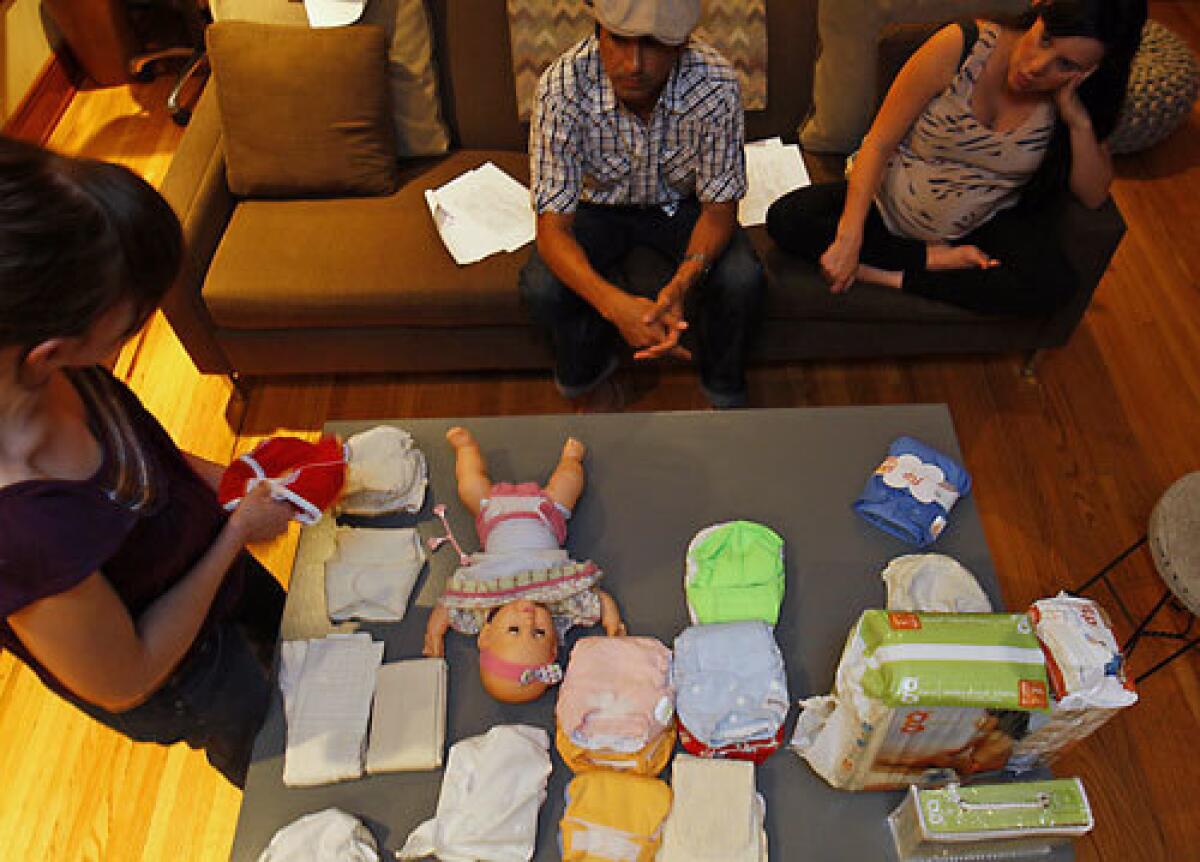When choosing a diaper is clothed in anxiety

On a recent Friday night, a very pregnant Sheila Dos Santos and her husband were two-thirds of the way through an hour and a half cloth diapering workshop, trying to wrap their heads around the myriad diapering options available to the modern parent.
Laid out on the large coffee table in front of them were dozens of types of diapers and covers and inserts, as well as a plastic baby doll to try them on.
“I’m so overwhelmed,” said Dos Santos, looking down at the 11-page booklet she held in her hands.
The workshop was being given by Lena Hill, Lisa Hubbard and Jennifer Rodriguez, three new-ish moms who are planning to open Los Angeles’ first cloth diapering store, Tush (www.tushdiapers.com), in early June.
Dos Santos, who said she wants to use cloth diapers for environmental reasons, found the Tush women when she went on a local moms message board in search of advice on how to navigate the increasingly complicated world of cloth diapers.
Just as it has with baby carriers, organic baby clothes and even modern baby furniture, the Internet has brought about a cloth diapering revolution. Dos Santos had already spent hours traveling down the Internet rabbit hole, trying to figure out the difference between pocket diapers from brands like Happy Heiny and bumGenius, prefolds and covers from Econobum, and fitted diapers and covers from Thirsties.
For those moms who do plan to use cloth diapers, making the correct choice can be fraught with anxiety. Are hemp inserts a better bet than bamboo? What type of diaper cover breathes the best but will also eliminate leaks? Which ones are the most environmentally friendly? What is the most organic choice?
These decisions feel all the more important because, according to the Tush handout, a reasonable supply of newborn-size fitted diapers and covers can cost close to $700. And that just lasts for the first six months of the baby’s life. That’s a lot of cash if you find the diapers you purchased don’t fit your baby or are too confusing to use.
That’s where Tush comes in. Hubbard, Hill and Rodriguez know firsthand the amount of trial and error it can take to find the right cloth diaper for your child, and they know how frustrating it can be when all your research is done online, so you are never able to hold the diaper or see how it would fit your baby. What if you have a super soaker who can pee through a diaper in 20 minutes? Or a 4-month-old with extra chubby thighs? They envision Tush as a place where parents can bring their babies for diaper fittings and see and hold different diaper choices before they purchase them.
“Diapering is very personal,” said Hill. “It depends on the child and the parent which diaper suits them best.”
The store, which for now will be run by appointment only out of Rodriguez’s Eagle Rock home, also will host cloth diapering workshops like the one they were conducting now — where the three Tush women take parents through the reasons to choose cloth diapers, the varieties on the market and, of course, the all important issue of how to clean them. (They do not recommend diaper services, to avoid nonorganic chemicals used for sterilizing diapers, and instead suggest that parents handle the unpleasant task themselves with something called the bumGenius diaper sprayer, which attaches to a toilet.)
When the subject of poop came up during the how-to-clean-cloth-diapers portion of the workshop, Hill squealed, “Yay! Our favorite subject!” and then turning to Dos Santos and her husband, Nathan Iverson, added “You’ll be talking about poop for years.”
All this genuine diaper enthusiasm may seem a bit bewildering. Yes, these women are starting a business, which might explain some of the depth of their diapering knowledge, but one can’t help but wonder, how much does anyone need to know about diapering — cloth or otherwise.
According to Sharon Hays, a professor of contemporary gender studies at USC, an hour and a half diapering workshop falls neatly into what she calls “the extraordinary pressure of intensive mothering.”
“Intensive mothering” is a term she coined in 1997 in her book “The Cultural Contradictions of Motherhood.” She describes it as a “child-centered, expert guided, emotionally absorbing, labor intensive, financially expensive ideology in which mothers are primarily responsible for the nurture and development of the sacred child and in which children’s needs take precedence over the individual needs of their mothers.”
“Choice is supposed to be a good thing,” she said, “but it becomes overwhelming when there is this nagging sense that you must somehow do it right.”
I asked the women of Tush whether they consider themselves diaper proselytizers or simply diapers enthusiasts. Do they think everyone should take an hour and a half workshop before choosing which diaper to put on their baby?
The answer was an emphatic no.
“Coming to the decision to cloth diaper is a personal, family decision and not one we would ever push on any parent,” said Rodriguez. “If a parent expresses interest, of course we’re gonna bowl them over with our verve for it and encourage them to give it a try.”
“We know how difficult being a parent is and wouldn’t want to pass judgment on any other parent for the choices they make,” said Hill.
In the meantime, a week after the diaper workshop Dos Santos decided to use a diaper service, at least in the beginning.
“I can’t imagine having to clean all those dirty diapers the first few months and learn about them,” said Dos Santos. “It would be too overwhelming, so I’m taking it one step at a time.”
Click here for a look at more stories on parenting from the Los Angeles Times.
